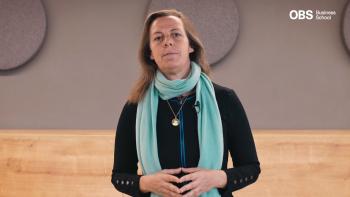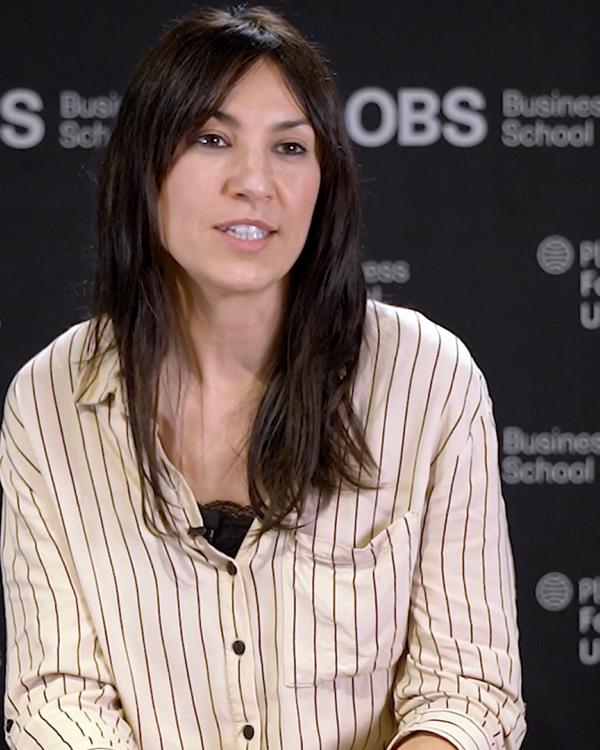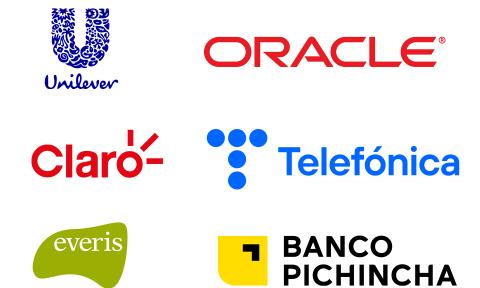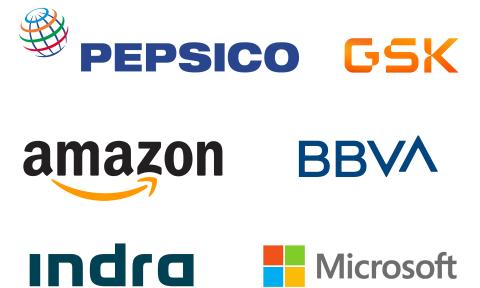
Executive MBA
- ONLINE
- 60 ECTS
- 13900€
- OPEN CALL
- 12 MONTHS
- ENGLISH
The Executive MBA provides you as an executive with a global strategic business vision to increase your potential in organizational management. This MBA has been recognized as the TOP 4 in Spain in the QS Online MBA Ranking and has four QS Stars.
It has been included among the Best Online MBAs in the world according to the prestigious Financial Times Ranking and is considered the 3rd best MBA in Spanish in the world according to the FSO (Online Higher Education) Ranking.
Our Executive MBA is also available in Spanish:
Find out more about SPANISH Executive MBA

Executive MBA

Universitat de Barcelona
Get a double degree from our academic partner, the reference university in Catalonia and Spain with more than 560 years of history behind it.

Four QS Stars Rating System
The Executive MBA is ranked TOP 4 in Spain in the QS Online MBA Ranking and is recognized with four QS Stars from the prestigious QS Stars Rating System.

Financial Times
In 2013, the Executive MBA was on the TOP100 Online MBA List of the leading international ranking prepared by the prestigious U.S. financial newspaper Financial Times.
Executive MBA Syllabus
The programme is structured in four blocks and ends with the development of a Final MBA’s Project. Moreover, during the development of the program you will have the opportunity to take three different voluntary bootcamps and additional activities.
Block 1. Analytical principles
Block 2. Strategic concept
Block 3. Management
Block 4. Developing management skills
Final Project
Bootcamps and additional activities
1. Analytical principles
The development of international businesses requires a great skill for analysing the main macro-economic forces (culture, politics, law and economics). The knowledge and skills to interpret how economic integration processes are evolving and the role of the government in the field of international business will enable managers to identify the main business challenges and opportunities at any given time.
Lecturer: Francesc Busquet, Senior Associate at PwC Switzerland and PhD. Research Associate & Data Scientist at University of St.Gallen.
SEE LINKEDIN
This module covers the basic concepts and analytical techniques in relation to sustaining the competitive advantage of organisations. It deals with important classic and contemporary subjects such as industry analysis, the core competence of organisations, top management teams and corporate governance, scope of product and market decisions and analysis of the value chain. It also covers the design and structure of organisations and how environmental forces and internal power struggles affect them.
Lecturer: Alejandro Lus, Technical Excellence Principal Engineer, EMEA at Dematic Logistics Systems.
SEE LINKEDIN
The financial diagnosis module aims to teach students about the financial statements of a company recognised by current accounting regulations, how to apply the techniques and tools used in financial diagnosis and how to interpret the meaning of the accounting information contained in financial statements. This will make students able to diagnose the situation of a company based on financial and economic analysis of assets, using the information provided by financial statements.
Lecturer: Jerónima Revelo, Financial Analyst & Consolidation Responsible at Kao Europe Group in Spain and Manager at Deloitte S.L.
SEE LINKEDIN
This subject focuses on the design and implementation of a successful combination of marketing variables to carry out the company strategy in its target markets. The concepts and theories underlying marketing decisions will be introduced in the course and students will be taught the basic principles of the marketing mix. Students will learn more about marketing management strategies, segmentation, targeting and positioning.
Lecturer: Natalia Martín, Professional and Management Development Training at Burgos University.
SEE LINKEDIN
2. Strategic concept
This is an advanced course in competitive strategy. Students will learn to evaluate the strategic situation the company is in and will cover topics including both the process and the content of competitive action and reaction, strategy models, brands as a source of competitive advantage, methods to compare competitive offers and strategies, decision trees, scenario analysis and competitive intelligence.
Lecturer: Isabel Sánchez, Business Continuity and Crisis Manager in Volkswagen Bank.
SEE LINEKDIN
The goal is to teach students to make optimal investment and financing decisions. Topics include assessing financial results, asset valuation, capital budgeting, risk and return in the context of the capital assets valuation model, the capital structure theory, dividend policy, short-term financial planning and budgeting and long-term planning and financial projection.
Lecturer: Ralph Michaud, Partner at Connecting Visions and Co Founder & COO at Star Startup.
SEE LINKEDIN
This subject focuses on the development and implementation of marketing strategies globally. Covered topics include internationalisation strategies and entry to foreign markets, analysis of market studies, consumer behaviour, the development of marketing programmes, product and service design for global and local markets, the choice of distribution channels, pricing products & services and portfolio management.
Lecturer: Jaime Santa Olalla Juel, Head of Business Development at Flixbus.
SEE LINKEDIN
The purpose of this module is to develop managers and professionals who can contribute to the success of an organisation by aligning talent and human resources with the objectives and strategy of the organisation. In this regard, the module offers students an overview of critical issues, theories and practices in the field of Human Capital Management.
Lecturer: María Narváez, PhD. Global Talent Director at Mapfre.
SEE LINKEDIN
This module offers a systematic approach to solving a wide range of problems in operations management and the supply chain, seen from the perspective of general management, rather than an operations specialist. It focuses on key concepts in the areas of operations management and information technology, which have become central pillars of global operations. It also covers a sample of the key tools and techniques that prove to be extremely useful in supply chain management. The covered topics are equally relevant to the sectors of manufacturing and services.
Lecturer: Ana Alexandra Tovar Soto, South of Europe Indirect Procurement Market Lead & Europe Indirect Procurement Shared Sevices Lead at C&A.
VIEW LINKEDIN
In this module, participants will learn how digitalisation has revolutionized the interactions between companies and their customers / consumers. The digital ecosystem offers powerful tools to reach consumers along the sales pipeline: online graphic ads increase awareness, search listings reach consumers with purchase intention, e-commerce facilitates conversion and social media provides dynamism and contributes to customer loyalty. In this course, we will cover the what, why, and how of the current major approaches, including search engine optimization, website analysis, search and display ads, email marketing, social media, and listening/monitoring online.
Lecturer: Ericka Espino, General Director at MAKE & Co-Founder en Read2Give.
VIEW LINKEDIN
3. Management
This is an integrating module covering all the strategic aspects of the administration of information technology in the company. Information and communication technologies play multiple roles within an organizational context: a) from a technological perspective, they define the information and communication infrastructure of the company and allow new ways of digitizing business processes; and b) from a managerial perspective, they facilitate a new coordination and communication within and between entities, allow new forms of organization, change the information environment underlying the business and allow new incentive structures. Successful digitization efforts must take into account both technological and managerial perspectives. Based on real cases, this module will study how the implementation of information technology changes the interactions and processes within organizations and with other stakeholders.
Lecturer: Isabel Sánchez, Business Continuity and Risk Manager in Volkswagen Bank.
SEE LINEKDIN
This module develops the necessary qualitative thinking and quantitative skills for the analysis of managerial data. The analysis of data and decision making under uncertainty explores the possibilities of using statistical data to create models that help management decision making. This course develops experience in a standard set of statistical and graphical techniques, which will be useful for analysing data related to the business. These techniques are widely applied in a number of management areas, including operations management, marketing, finance and economics. The module offers a different perspective of statistics as a methodology to face uncertainty.
Lecturer: Mario Poveda, Senior Data Analyst at Annalect (Omnicom Media Group).
VIEW LINKEDIN
This module is designed to develop global business leaders. The course covers the main topics of inter-cultural management that companies face when operating internationally. The content includes the current international environment, the effects of globalisation on company management, the cultural dimension of international management, and intercultural communication and leadership.
Lecturer: Pelayo Bolívar, CEO & Founder at Gurban Sustainable Agriculture.
VIEW LINKEDIN
This subject focuses on the importance of organising the information required in the company for making decisions. Good management planning and control are critical to support these decisions. The different information collected as a result of a company's activity must be organised and structured to make products profitable and for making decisions, for instance when choosing between buying or producing internally, marketing a particular product line or not, managing production capacity, etc.
Lecturer: Jerónima Revelo, Financial Analyst & Consolidation Responsible at Kao Europe Group in Spain.
SEE LINKEDIN
This topic covers the basics of commercial direction and sales management. Students will analyse the concept and content of commercial direction strategies, as well as sales organisation, planning and objectives. Covered topics include sales forecasts and quotas, territorial organisation, specific features of the sales force, training, motivation and remuneration of the sales force and sales management activities.
Lecturer: Santiago Rangel, Multinational Client Segment EU/UK Sales Coordinator and Head of Human Resources at Aubay, Iberia.
VIEW LINKEDIN
This module introduces the concepts of risk and return, fixed and variable income, options and futures contracts. It evaluates all investment alternatives in relation to financial instruments and their risk profile. Students will analyse expected performance characteristics individually or in combination within a portfolio. Different investment strategies and valuation models will be used to understand the basic, practical principles of investment.
Lecturer: Rafael Hurtado Coll, Chief Investment Officer (CIO) and Chief Strategy Officer (CSO) Allianz AM, Spain.
VIEW LINKEDIN
The aim of the subject is for students to have the capacity to demonstrate an understanding of the financial system, how it operates and its components; how to analyse the performance curve; the term structure of interest rates and interaction with the exchange rate; sources and types of financing for businesses in the short, medium and long term; the structure and operations of financial institutions and markets; the main types of risk and derivatives available to manage financial risk; and the structure, functions and role of supervision in financial markets.
Lecturer: Rafael Hurtado Coll, Chief Investment Office Allianz AM in Spain.
VIEW LINKEDIN
4. Developing management skills
This module goes beyond a basic understanding of effective leadership and focuses on achieving high-impact leadership. Leadership in organisations focuses on the design of organisations and how managers can make organisations more effective, maximising the performance of its members. There is a focus on problems at organisation level, such as how an organisation should be designed, what strategy should be followed and how conflict and policies detrimental to the organisation can be managed. It teaches students how to analyse individual performance issues within complex organisations and how to manage changing processes.
Lecturer: María Povedano, Senior Associate - Talent HR Consultant & Coach at Mercer Spain.
VIEW LINKEDIN
Students will learn about and use the main techniques of negotiation and conflict resolution in an international environment, to understand the steps of the intercultural negotiation process, as well as to be able to design strategies that can be applied in specific situations.
Lecturer: Jaime Vega, Global Client Manager at Mercer.
VIEW LINKEDIN
This module provides students with the tools required to fully understand the entrepreneurial process. This course focuses on recognising and looking for business opportunities, evaluating the feasibility of new projects and learning how to manage business growth.
Lecturer: Jorge Tuñón, Lecturer and research fellow on communication en Universidad Carlos III de Madrid.
SEE LINKEDIN
TFM y Actividades adicionales
Once enrolled, the student will have the opportunity to take two pre-master bootcamps. These bootcamps will be progressively opened, and the student can take them at any time. A teacher will address students' concerns and doubts until the effective start of the program. Upon completion and passing of the course, the student will receive a certificate. The bootcamps are as follows:
- Building Your Professional Brand for Employability and Career Success
- Finance Fundamentals
Developing strategic plans
A complete, well-developed business plan provides a company's key management framework and is an essential tool for any entrepreneur. The process of drawing up a business plan provides an in-depth view of the complex interdependence of the functional elements of a viable organisation: marketing, finance, management and leadership, and systems and operations.
Lecturer: Alejandro Lus, Technical Excellence Principal Engineer, EMEA at Dematic Logistics Systems.
SEE LINKEDIN
The Final Project: Business plan
As the final Master's project, students will develop a Business Plan. They will have to draw up a business plan to put into practice the knowledge acquired throughout the programme. The plan can be drawn up regarding a new venture or a project in an existing company, requiring modifications and variations to add value and a differential advantage over what already exists. However, the ideal situation would be drawing up an idea for a business, which could be implemented in the current market.
The Business Plan is written under the guidance of the academic department and in partial submissions, meaning that its progress can be monitored. The Business Plan is a group project, which will be completed in teams, except in appropriately justified situations.
Lecturer: Alejandro Lus, Technical Excellence Principal Engineer, EMEA at Dematic Logistics Systems.
SEE LINKEDIN
The Executive MBA is complemented with lectures and seminars which will be held in each of the blocks. These additional activities are performed by renowned professionals in the project management field who, through videoconferencing, will introduce students to their experiences and case studies.
Bootcamp: Sustainability & ESG
The bootcamp focusing on ESG (Environmental, Social, and Governance) and sustainability cover a wide range of topics to provide participants with a comprehensive understanding of these crucial areas. The workshops will cover issues related to ESG and sustainability, current trends and regulation, understanding of factors, integration of ESG on business strategy, CSRD and its impact… Throughout the bootcamp, will be analyzed several presentations, group discussions, case studies, and interactive activities to keep participants engaged and facilitate knowledge retention.
Lecturer: Isabel Sánchez, Business Continuity and Risk Manager in Volkswagen Bank.
VIEW LINKEDIN
Bootcamp: Competences, Leadership and transformation on business
Work in organizations is increasingly structured around managing high-performing teams, but leading one requires guided practice. Success in leadership requires understanding what a purpose-driven team is, how it should be formed, and how to execute good leadership and team management to achieve excellence. In this bootcamp the student will understand the way and concept to promote relevant changes on organizations being more efficient and creative.
Lecturer: Ignacio Marina Ruiz de Loizaga, Senior Manager FS Consulting at KPMG Spain.
VIEW LINKEDIN
‘Case studies’
The practical component of the program is essential and complements the theoretical training. Therefore, during the course discussions are held of topics of current or particular interest in each of the subjects, simulations of decision-making applied to real situations or to resolve practical cases where problems and their proposed solutions are analysed from an academic point of view, as well as the criteria taken into account to carry them out.
Webinars
Most of the training is done asynchronously; it means that the exchange of knowledge is done through a software platform that allows sharing written texts without having people to be connected at the same time.
Company Visits
During the program, students will have the opportunity to assist to different web conferences with experts in different areas, related with the program. These professionals will share their knowledge and experience and will provide students with the best practices in the field.
Students taking the Executive MBA at OBS Business School will have the opportunity to prepare for the following certifications*:
- Scrum Master & Product Owner Certification
- Scrum Master@Scale Certification
- Product Owner@Scale Certification
- Value Stream Management Certification
*The cost of the certifications and the preparatory course are not included in the price of the program.
Methodology

OBS has an online methodology where the core is the student. Always backed by active and internationally renowned lecturers, who share their knowledge to enhance the professional development of students through a flexible, collaborative method with personalised monitoring. The aim is to create a unique educational experience that allows the assimilation of knowledge in a practical way.
Student ON's fundamental pillar is the student and, for this reason, throughout the course students have their Programme Manager, an academic figure who accompanies them in a personalised way.
Diploma
After successfully completing the Master's degree and having completed the relevant procedures, you will receive the Master's degree from OBS Business School. In addition, you will have the possibility of obtaining a Longlife Learning Master's Degree from the University of Barcelona (UB), provided that you meet the established academic, documentation, payment, and administrative requirements.
To obtain it, you must have a University Degree. In the exceptional case of not having this degree and having passed the Master's evaluations, you will obtain a Higher University Diploma from the University of Barcelona (UB).
At OBS Business School we are committed to our own degree that allows us to update the programmes in each edition in order to be at the forefront of the knowledge demanded by companies today. Our programmes are focused on professionals who want to update their management skills while living an international experience, basing our value proposition on a global academic approach.

Admissions Process
The fundamental aim of our admissions process is to ensure the suitability of candidates. All participants should get the most out of this learning experience, through a context in which it is possible to develop long-term relationships with classmates, faculty and alumni.
To be admitted to the Executive MBA, students must have a university degree or higher, with a minimum of 7 years of professional or managerial experience to ensure an optimal development of the programme.
After completing the application form for one of our programmes, you will receive an e-mail with information about the School and a member of the Admissions Department will contact you to start the admission process. Once you have successfully passed the personal interview, you must submit all the required documentation to continue the admission process and certify that you meet the requirements of the student profile. After the Admissions Committee, if it is positive, you will be able to register and enrol in the programme you have applied for.
Student Profile
The Executive MBA students have an average of 14 years of experience, come from 17 nationalities and share a common goal: to enhance their management skills to boost their professional careers. Year after year, the most prominent multinationals and companies from different productive sectors count on their talent, making a clear commitment to diversity, internationalisation and leadership.


